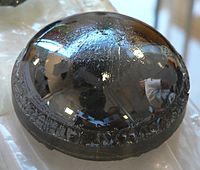
Photo from wikipedia
In the present study, the thermal cycling stability of mirrors made of silicon particle reinforced aluminum compounds, containing an amount of 42 ± 2 wt.% silicon particles, is investigated with… Click to show full abstract
In the present study, the thermal cycling stability of mirrors made of silicon particle reinforced aluminum compounds, containing an amount of 42 ± 2 wt.% silicon particles, is investigated with respect to thermal loading. The compound is processed by single-point diamond turning to optical mirrors that were subsequently thermally cycled in a temperature range between 40 °C to −60 °C and between 20 °C and −196 °C, respectively. The residual shape change of the optical surface was analyzed using Fizeau interferometry at room temperature. The change of shape deviation of the mirrors is compared with dilatometric studies of cylinders using the same temperature regime. Due to different coefficients of thermal expansion of the two constituents of the compound, thermal mismatch stresses in the ductile aluminum matrix and the brittle silicon particles are induced by the investigated thermal loads. The plasticity that occurs causes the formation of dislocations and stacking faults as substantiated by Transmission Electron Microscopy. It could be shown that the silicon particles lead to the cold working process of the reinforced aluminum matrix upon thermal cycling. By using interferometry, a higher dimensional stability of mirrors made of silicon particle reinforced aluminum due to thermal loads is demonstrated.
Journal Title: Materials
Year Published: 2022
Link to full text (if available)
Share on Social Media: Sign Up to like & get
recommendations!